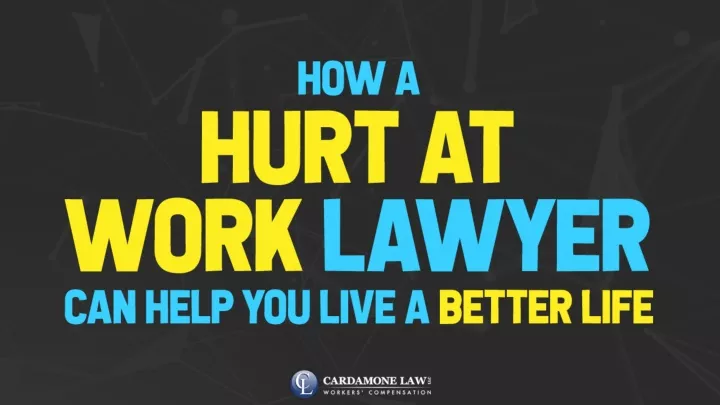
Legal Representation

Navigating the legal complexities of a workplace injury can be daunting. A lawyer specializing in workers’ compensation can provide invaluable guidance and representation, ensuring your rights are protected and maximizing your compensation.
Seeking legal advice promptly after a workplace injury is crucial. A lawyer can help you understand your legal options, gather evidence, and build a strong case to support your claim. They will negotiate with insurance companies and represent you in hearings or trials, ensuring your interests are represented at every stage of the process.
Types of Compensation
Injured workers may be entitled to various types of compensation, including:
- Medical expenses: Coverage for all medical expenses related to the injury, including hospital stays, surgeries, and rehabilitation.
- Lost wages: Compensation for income lost due to the injury, including temporary disability benefits and permanent disability benefits.
- Vocational rehabilitation: Assistance with job training or retraining if the injury prevents you from returning to your previous job.
- Pain and suffering: Compensation for physical and emotional pain caused by the injury.
Workplace Accident Investigation
When a workplace accident occurs, it’s crucial to conduct a thorough investigation to determine the cause and prevent similar incidents in the future. This investigation typically involves several steps, including:
Employer’s Role
- Secure the accident scene to prevent further injuries or damage.
- Notify relevant authorities (e.g., OSHA, insurance company).
- Interview witnesses and gather statements.
- Preserve physical evidence (e.g., equipment, materials).
- Analyze the evidence and determine the root cause of the accident.
- Implement corrective actions to prevent similar accidents in the future.
Importance of Preserving Evidence
Preserving evidence is essential for an accurate investigation. This includes:
- Taking photographs and videos of the accident scene.
- Collecting physical evidence (e.g., damaged equipment, clothing).
- Interviewing witnesses and documenting their statements.
Obtaining Witness Statements
Witness statements can provide valuable insights into the accident. When obtaining witness statements, it’s important to:
- Interview witnesses as soon as possible after the accident.
- Ask open-ended questions and allow witnesses to provide their own accounts.
- Document witness statements accurately and thoroughly.
Workers’ Compensation Claims
Workers’ compensation is a form of insurance that provides benefits to employees who are injured or become ill due to their work.
To be eligible for workers’ compensation benefits, you must meet the following requirements:
- You must be an employee.
- You must have been injured or become ill due to your work.
- You must file a claim within the time limits set by your state.
The process for filing a workers’ compensation claim varies from state to state, but generally involves the following steps:
- Report your injury or illness to your employer.
- File a claim with your state’s workers’ compensation board.
- Attend a hearing to determine if you are eligible for benefits.
- Receive benefits if you are found to be eligible.
Employer Liability

Employers have a legal obligation to provide a safe working environment for their employees. This includes taking steps to prevent workplace accidents and injuries. If an employee is injured on the job, the employer may be held liable for the damages.
Negligence is a legal concept that refers to the failure to exercise reasonable care. In the context of workplace accidents, negligence can occur when an employer fails to take reasonable steps to prevent an accident from happening. For example, an employer may be negligent if they fail to provide proper safety equipment, training, or supervision.
There are a number of defenses that employers can raise in workplace injury cases. One common defense is that the employee was contributorily negligent. This means that the employee’s own actions contributed to the accident. Another common defense is that the injury was caused by an “act of God” or other force majeure event.
Damages and Compensation
In workplace injury cases, damages refer to the financial compensation awarded to an employee who has suffered harm due to an employer’s negligence or wrongdoing. These damages aim to compensate the employee for their losses and provide a measure of justice.
Damages can be classified into two main categories: economic and non-economic. Economic damages are quantifiable financial losses, such as medical expenses, lost wages, and loss of earning capacity. Non-economic damages are more subjective and include pain and suffering, emotional distress, and loss of enjoyment of life.
Factors Considered in Determining Damages
Several factors are considered when determining the amount of damages to be awarded in workplace injury cases. These include:
- Severity of the injury
- Medical expenses incurred and anticipated future medical costs
- Lost wages and loss of earning capacity
- Pain and suffering
- Loss of enjoyment of life
- Comparative negligence of the employee
li>Emotional distress
Process for Recovering Damages from an Employer
To recover damages from an employer, an employee typically needs to file a workers’ compensation claim or a personal injury lawsuit. Workers’ compensation is a no-fault system that provides benefits to employees who are injured on the job, regardless of who was at fault. Personal injury lawsuits are filed in civil court and allow employees to seek damages for negligence or other wrongdoing by their employer.
The process of recovering damages can be complex and time-consuming. It is advisable to seek legal advice from an experienced attorney to navigate the legal system and ensure that you receive fair compensation for your injuries.
Case Studies

Workplace injury cases can vary widely in their complexities and outcomes. Successful cases often hinge on the strategies employed by lawyers and the preparedness of individuals filing claims. Here are some examples of successful workplace injury cases and insights into the strategies used:
Strategies for Favorable Outcomes
- Establishing liability: Identifying the responsible party and proving negligence or wrongdoing.
- Gathering evidence: Documenting injuries, medical expenses, lost wages, and witness statements.
- Negotiating settlements: Reaching fair agreements with insurance companies or employers without going to court.
li>Litigating in court: Pursuing legal action when negotiations fail to yield satisfactory results.
Tips for Filing a Claim
Individuals considering filing a workplace injury claim should consider the following tips:
- Seek medical attention immediately: Promptly documenting injuries is crucial for establishing a causal link between the injury and the workplace.
- Report the injury to your employer: Follow company procedures for reporting workplace injuries.
- Gather evidence: Collect medical records, witness statements, and any other relevant documentation.
- Consult an attorney: Seek legal advice to understand your rights and options for pursuing a claim.




